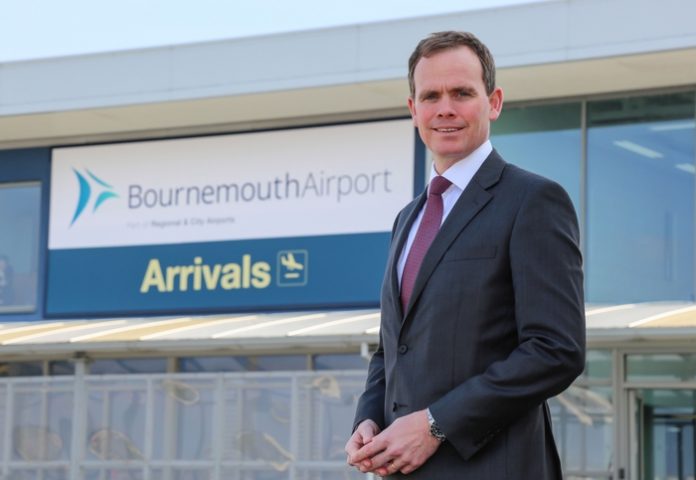
Regional & City Airports (RCA), the UK’s leading regional airport operator, has called on the aviation industry, alongside the Government, to help support its post-Brexit vision of turning the UK’s regional airports into free ports in order to guarantee the continued success of the sector.
Speaking at the annual Airport Operators Association (AOA) conference yesterday (30th October 2018), RCA Chief Executive Andrew Bell said that adopting a post-Brexit free port strategy, which covers regional airports, would ensure a continuous flow of vital goods and trade across the whole of the United Kingdom.
In addition he said such a measure would provide a much-welcomed business boost to regional airports, many of which currently operate on a marginal basis.
Free port status would help ensure their long-term survival and enable greater investment, even opening up the potential for new passenger routes internally and abroad.
RCA owns Bournemouth Airport, Coventry Airport, Exeter Airport and Norwich Airport, and operates Blackpool Airport, City of Derry Airport and Solent Airport on behalf of their owners.
Andrew said: “What is clear is that following our departure from the European Union, the UK Government should have the ability to establish its own trade and customs policy.
“This freedom includes the ability to set tariffs, including different duty rates for certain goods, or in certain areas.
“Within that there is the option to create ‘free ports’ – where goods entering and exiting a designated zone would not be subject to any tariffs – or if they are – can be offered at a discounted rate.
“Anywhere can be selected as a free port and Britain’s regional airports offer a compelling case.
“Designating regional airports as free ports would also attract new investment into local areas and further the Government’s own goal of addressing the geographical imbalance in economic growth.
“We have had the Northern Powerhouse and the Midlands Engine so why not the Regional Airports Accelerator?
“We are already having positive conversations with the Government about how they can take a lead on this but I would urge all sections of the aviation industry to come together to support these measures.”
Free ports are designed to provide key incentives for domestic and foreign companies’ supply chains.
With increased trading activity in the port, an agglomerating effect of economic activity in the area surrounding it begins as businesses shift their manufacturing and distribution operations.
The model already exists and countries all over the world, from the United States, through the Middle Eastern City states, to the free-trading hub of Singapore, have already successfully established free ports.
There are approximately 3,500 free ports operating worldwide, employing 66 million people across 135 countries.
The UK currently operates over 160 ports including air, road and sea which account for 75% of all UK trade.
Last year trade between the EU and UK reached £593 billion.
The UK was the second largest port sector in EU but, as a member of the single market, it was unable to set its own tariffs against the goods entering and exiting its ports.
Andrew added: “Brexit offers the UK Government the ability to create free ports at regional airports and unleash their economic potential.
“According to the Centre for Policy Study’s research on free ports, even applied to just to the UK’s biggest Northern ports, the policy would create 86,000 jobs, provide a much needed boost to the manufacturing sector, as well as boost productivity and wages.
“If the free port initiative were applied to regional airports, these effects, already measured for the North, could be expanded to communities across the country.
“Airports and airlines are seeing an increasing importance in international trade, but there is even greater potential to be realised.
“Now is the time for these ideas to be driven forward into reality.”
Karen Dee, Chief Executive of the Airport Operators Association, said: “Our Annual Conference is an opportunity for the aviation industry to come together and look at what the future of our sector should be.
“This is particularly important right now, in light of Brexit.
“The forthcoming Aviation Strategy is an ideal opportunity for Government to commit to a domestic policy agenda which ensures UK airports can continue to support a competitive UK economy post-Brexit.
“The debate at our Annual Conference will have given them some excellent suggestions to consider as part of that.”




















